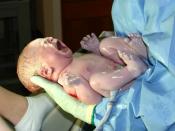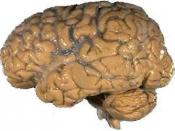From birth to 18 months, children go through a considerable amount of changes. These changes are influenced by the interactions that adults, such as parents and caregivers, have with these infants. Adults play a very important role in the development of infants. Little things, such as touch, talking to, feeding , and responding to an infants cry, have a major impact on his or her cognitive as well as physical and emotional development. These are some of the most basic needs that help children grow, learn and thrive (Brazelton and Greenspan 2000). In other words, adults help infants learn what it is like to be a human being.
According to a Puritan belief in the sixteenth century, children are born evil and stubborn. Puritans thought that children needed to be civilized and that harsh restrictive child rearing practices were needed to tame children. During the seventeenth century, a British philosopher, John Locke, viewed children as a "blank slate," whose character is shaped by experience.
Over the past few centuries, researchers have discovered, and parents as well, that children are not born evil and they are not "blank slates" to be shaped. Children, infants to be more specific, are skilled, capable beings who display many complex abilities (Berk 2003). Reflexes, such as eye blinking, crying, and sucking, are the most obvious of the organized behavior patterns that infants are born with. These reflexes help infants control their distress and amount of stimulation, as well as communicate with adults around them. Through responsiveness to these reflexes, adults help infants develop cognitively (Strathearn, Gray, O'Callaghan, and Wood 2001). The adult's responsiveness teaches the infant basic trust. Through a constant pattern of distress and relief, such as crying due to hunger and being feed, the child learns that their basic needs will be met...


